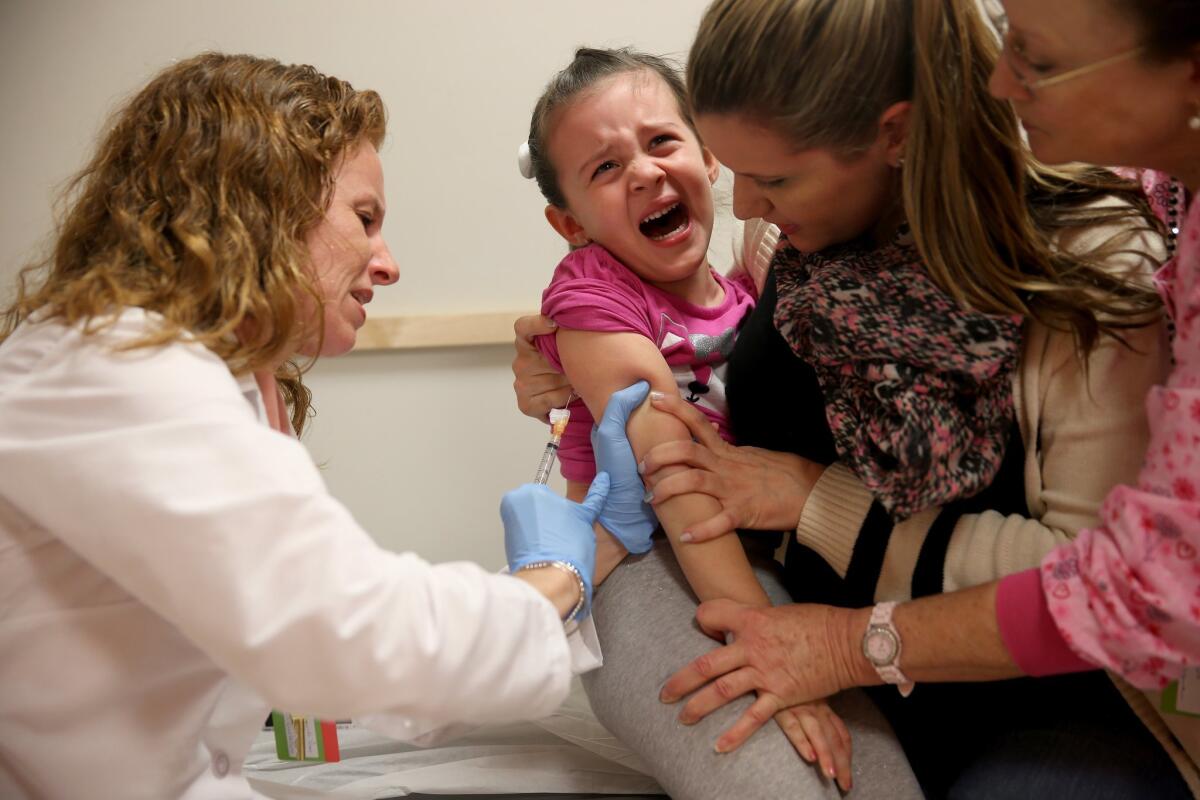Opinion: A Supreme Court quote anti-vaxxers will love

- Share via
The refusal of many parents to vaccinate their children against measles has become a political story. Some (but not all) Republican presidential hopefuls are giving aid and comfort to anti-vaxxers. Meanwhile, some have argued (unpersuasively) that President Obama is guilty of the same sort of pandering.
Outside the realm of electoral politics, a debate rages over whether credulity about the “dangers” of vaccination is primarily a feature of right-leaning libertarians or liberals who also harbor ridiculous fears about genetically modified food.
No one to my knowledge has mentioned that the anti-vaccination movement also has an interesting connection to the Supreme Court and the judicially created right to abortion.
In 1925, in Pierce vs. Society of Sisters, the court struck down on constitutional grounds an Oregon law that required children to attend only public schools. Ruling in favor of an order of Catholic nuns and a military academy, the court held that the law “unreasonably interferes with the liberty of parents and guardians to direct the upbringing and education of children.”
The decision includes this famous sentence: “The child is not the mere creature of the state; those who nurture him and direct his destiny have the right, coupled with the high duty, to recognize and prepare him for additional obligations.”
This ringing affirmation of parental authority continues to resonate in conservative and libertarian circles. The website of the Home School Legal Defense Assn. says it was established “to defend and advance the constitutional right of parents to direct the education of their children and to protect family freedoms.”
But does the Constitution really give parents the power to decide how their kids will be educated? Not explicitly, but the court located such a right in the 14th Amendment, which says that no state may “deprive any person of life, liberty, or property, without due process of law.” In a previous decision, the court had said that liberty “denotes not merely freedom from bodily restraint” but also a constellation of other fundamental rights.
Now for the abortion connection. The landmark Roe vs. Wade decision cites Pierce vs. Society of Sisters. Like the right to shape your child’s education, a woman’s right to abortion (rooted in a larger right of privacy) is derived from a broad reading of “liberty.”
Many Americans are offended by the idea that abortion rights are fundamental; but some of those same people would enthusiastically agree with the court that parents have a constitutional right to shape the upbringing of their children -- whether the issue is education or medical care.
I’m not saying that the Supreme Court necessarily would strike down a law requiring vaccination with no exemptions. But the court’s statement that “the child is not the mere creature of the state” isn’t that far removed from New Jersey Gov. Chris Christie’s insistence in his vaccination comments that “parents need to have some measure of choice in things as well.”
In American law as well as in American culture, parents rule.
A reader complained that I “said, basically, that the U.S. Supreme Court supports parents’ rights over health concerns on vaccinations, citing a parochial school case from 1925. The analogy is incorrect; the Supreme Court clearly stated in 1905 that health concerns justify mandatory vaccinations.”
Actually I didn’t say that the Supreme Court would strike down a requirement that children be vaccinated. In fact, I wrote: “I’m not saying that the Supreme Court necessarily would strike down a law requiring vaccination with no exemptions.” My point was the Supreme Court had used very expansive language about parental rights similar to that employed by opponents of vaccination (and supporters of home-schooling).
But I should have mentioned the 1905 ruling, which involved the prosecution of an adult who declined to be vaccinated for smallpox. (Here’s the court’s ruling in Jacobson vs. Massachusetts.)
Follow Michael McGough on Twitter @MichaelMcGough3
MORE FROM OPINION:
How secular family values stack up
A natural argument for the birth control pill
Remember political correctness? It’s back, frothing at the mouth and at hurricane force
More to Read
A cure for the common opinion
Get thought-provoking perspectives with our weekly newsletter.
You may occasionally receive promotional content from the Los Angeles Times.










